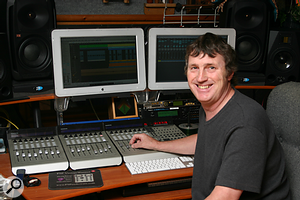There's an old adage that you can please some of the people all of the time, or all of the people some of the time; but striking the best balance between the two becomes increasingly difficult as recording technology becomes more fragmented. Understandably, those people who are using conceptually straightforward recording systems based on tape recorder or digital emulations of them have relatively few problems with their equipment, so tend to be more interested in reading hardware product reviews or articles on traditional recording and production techniques. If your studio is hardware-based, you might see coverage of computer-related recording issues as being largely irrelevant. But the reality is that a great many people are now relying on computers to perform almost all of their recording, mixing, synthesis and processing tasks, and because of the nature of computers, there are far more issues, concepts and fixes that need addressing than is the case in a hardware environment.
 It doesn't end there either, because some Apple users interpret our emphasis on PC-related problems as being a bias in that direction; but again it comes down to how many problems are looking for solutions. Apple-based systems tend to be less tricky to configure because there are fewer hardware variables to consider, so it's no surprise that fewer support-type articles are dedicated to them. Even if you really hate the idea of computers, it's worth keeping abreast of what they can do for you, because it's almost certain that at some time in the not-too-distant future you'll want to use them for some aspect of your work, whether simply for final mastering and CD production, or running your entire studio. I came into audio during the era of analogue tape and I hate unnecessary complexity as much as anyone, but my own projects are now carried out almost exclusively using Logic Audio because it offers facilities even high-end hardware studios can't offer and at a very affordable price.
It doesn't end there either, because some Apple users interpret our emphasis on PC-related problems as being a bias in that direction; but again it comes down to how many problems are looking for solutions. Apple-based systems tend to be less tricky to configure because there are fewer hardware variables to consider, so it's no surprise that fewer support-type articles are dedicated to them. Even if you really hate the idea of computers, it's worth keeping abreast of what they can do for you, because it's almost certain that at some time in the not-too-distant future you'll want to use them for some aspect of your work, whether simply for final mastering and CD production, or running your entire studio. I came into audio during the era of analogue tape and I hate unnecessary complexity as much as anyone, but my own projects are now carried out almost exclusively using Logic Audio because it offers facilities even high-end hardware studios can't offer and at a very affordable price.
Ultimately, articles on the mechanics of getting your studio to work are always going to be important; but once you have a system that you're comfortable with, the basic techniques of recording and producing music are remarkably similar, regardless of what platform you choose. Getting a good vocal sound using a PC running Cubase SX is no easier or more difficult than if you're using an ADAT or an analogue open-reel recorder. I know there's a tendency to form enclaves, defending the way you work against heretics from the other side (nowhere more obvious than in the Apple/PC debates that appear in our forums), but it really doesn't matter what tools a musician chooses to record his or her music providing they do the job.
Instead we should be celebrating the fact that we can buy the most incredibly powerful studio equipment, whether hardware or software-based, for a tiny fraction of what studios used to cost. In the '80s, a 24-track tape recorder used to cost about the same as a decent house, but now you can buy a better-specified digital 24-track recorder for well under £2000. Similarly, the early automated mixing consoles didn't do nearly as much as say the Yamaha 02R96 or the Mackie D8b, yet these new consoles cost barely five percent of what their ancestors did. Make no mistake — this is a great time to be a musician, and it's getting better all the time.
Paul White Editor In Chief
